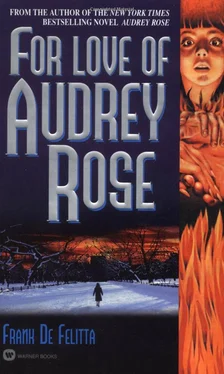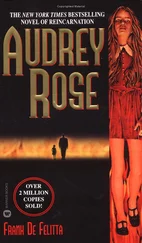“We must be very strong,” he said.
She blushed, turning her head. The day was different from the night. In the dark she was so different, so overmastered by her primitive instincts, but in the day she wanted to think clearly, to see clearly, to act correctly.
“The stakes are too high,” he said, trying to be matter-of-fact. “For both of us. In different ways.”
“I know,” she replied without conviction.
He looked at her. “It should be easier now that we come closer to civilization. Still, I don’t want to take any chances.”
“Nor do I,” she said defensively.
“Good,” he said simply, embarrassed. “Very good.”
By noon a passing truck stopped in the village and met them two miles out on the road. They squeezed in the cab. The driver spoke a little Hindi and a little Tamil, and soon Hoover had him chuckling loudly. The truck careened down the road. Suddenly the road became paved — a miracle of a smooth ride — and the driver agreed to drive all the way into Pondicherry.
He left them at a small hotel. There was only a single room left so Hoover slept on a lumpy couch in the fetid lobby, oblivious of the heat. Janice washed herself as best she could, soaked her clothes — her pitiful underclothes made her wince — and lay naked in the sheets. She tried to recapitulate all that she had seen in India, but it seemed to have happened to another person. As it had, she thought. Because she sensed that she was different. She was physically able to endure things that once would have crushed her. She had seen death — death on a vast scale. She had endured the hostility of the indifferent universe and survived.
And something else had changed. Had Hoover stepped quietly up from the lobby and knocked gently at her door, she would have let him in. It was not moral. It was indefensible. It would destroy Bill if he even suspected. But then, India had taught her about the struggle for existence. About the close relationship between fecundity and annihilation. And she was part of it now. She did not fight it, she welcomed it. Like Hoover, she would have to relearn how to graft a veneer of civilization upon a living being that had been through far too much.
Janice pondered long into the darkness of the night. She wondered if she had become tough or had merely degenerated in some terrible way. For an hour she nearly followed her impulse to go down to Hoover, to seek comfort from his warmth. But she resisted, though she did not know why. Who would know? Who would care? Down here, on the southeast coast of the Indian subcontinent? She stared into the darkness and wondered. Mercifully, sleep drifted into the seedy hotel and she knew only the partial answer of oblivion.
Elliot Hoover had prevailed upon the hotel keeper to prepare an English breakfast: muffins, bacon, tea, and marmalade. Sitting in a small dark room, with pictures of erotic sculptures of Kharjuraha, it felt more like a honeymoon than a rescue mission — the warmth of the morning, the wallpaper peeling decorously from the wall, even a painting of the Duke of Wellington, much faded, over the table. The scene was too relaxed, too humorous to speak of the emergency waiting for them in Manhattan.
Hoover cleared his throat, enjoying watching Janice consume her hearty breakfast. There was a twinkle in his eye.
“I thought we would take a boat up to Calcutta,” he said. “Then a flight from Calcutta. I think it hops to Munich and then to New York.”
“But what about our belongings? I’ve left everything in — God knows where sector five is.”
“You’re right. I’ve an account at Barclay’s in Calcutta, but there must be a branch office in Pondicherry.” He smiled. “I’ll draw out enough money to see us back in style.”
“When we return I want to pay for your trip to New York,” she said soberly.
“It doesn’t matter.”
“Please. I’d rather.”
“As you like. But don’t forget that I am not exactly in want.”
She studied him. He was a complex man, a gathering of contradictions. He could chant prayers all night with the utter belief of a Hindu native, and yet he was as shrewd as a stockbroker when it came to managing his fortune. He lived in two worlds, fit into them equally well, a man whose charisma seemed to flow outward from himself in an undisciplined discharge.
Hoover bought a brown jacket and trousers, some white shirts, leather shoes from Italy, and he had his hair cut at Pondicherry’s best hairstylist, where the barber threw up his arms at the matted, wild locks when Hoover walked in. Janice chose two short skirts, white blouses, and a new handbag. She bought a pair of sandals. Slipping into new underwear was an almost erotic thrill. She had forgotten the soft luxuries. It was like remembering a former life. Then she had her hair shampooed, cut, and styled. When she saw Hoover on the street they burst out laughing.
“I feel very strange,” she confessed, displaying her new skirt.
“It takes a few days to get used to it,” he agreed. “When I first arrived in New York from India I felt weird for a week.”
They booked passage on a freighter that left Pondicherry for the north. After four hours of pacing the deck in agitation, Hoover calmed down. There was a magnificent toot overhead that resounded through the harbor, the hawsers were thrown off, and a tiny tug nudged the coffee freighter out into deep water. As they turned around, Pondicherry seemed to bank slowly, gliding into the distance, its crowded white alleys and waterfront busy with traffic the way ants swarm over a dead white log.
The eastern seacoast of India glided by: sand dunes, bits of jungle refuse thrown up into clotted tangles at the mouths of rivers, and the broad blue ocean churned into a long white trail, arching backward as far as the eye could see. Janice and Elliot Hoover leaned against the orange rail and watched the continent go by.
“It’s a lovely land,” Janice said softly.
“The most beautiful in all creation.”
“I never suspected, never realized.”
He smiled. “Most people never do. India is too big. Too profound. One must come here to be changed.”
For nearly an hour they watched the herons dip low over the shore marshes, the tall egrets nesting where the tidal flats were shimmering in seawater. Boys were visible, pushing boats with long poles, nets outstretched for fish, and wooden shacks leaned precariously over the muddy concourse of the incoming tides.
“It’s life itself,” mused Hoover. “It is the source of all beauty. Life in all its complexity. It is the only source.”
Janice watched the sunlight reflecting from his well-tanned face. In his new clothes it would be difficult for anyone else to know what spiritual depths animated his every action, his every word. He looked like a German tourist on his way back to Bremen.
“In the mountains,” she confessed, “it occurred to me that you might have lost your faith. But I see I was mistaken.”
“Not lost it. Just realized it was far more difficult than I had thought. One wishes to do good, and ends up doing…doing…”
She placed her hand on his. “And ends up by doing good,” Janice said quietly.
Hoover smiled gratefully. He tried to express his feelings, but found himself curiously tongue-tied. Then the crew became extraordinarily busy, and the freighter curved around a semisubmerged obstruction and plowed serenely to the north.
It was not until well into the night that they reached Calcutta. The wharves were ablaze with lights from cranes and towers. Ship after ship was piled into the harbor, an army of sweating laborers bending low, pulling ropes, lifting coffee, rubber, bales, and auto parts up from holds. The sea was black, glistening with reflections of the world’s freighters at anchor.
Читать дальше












